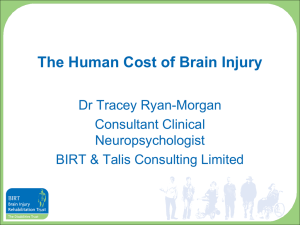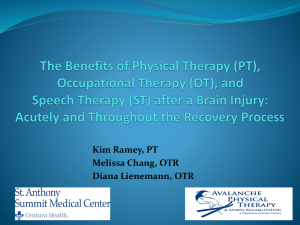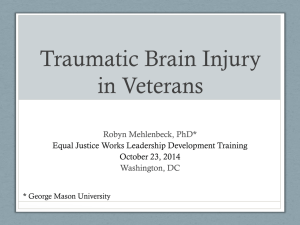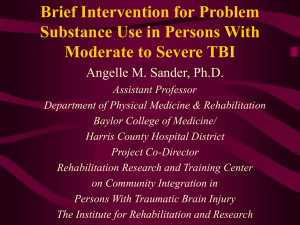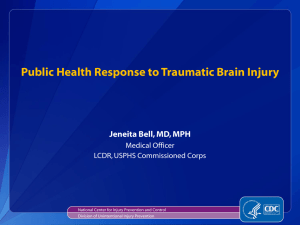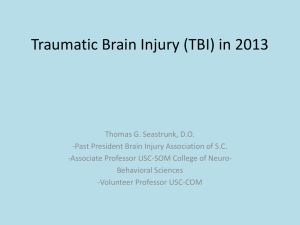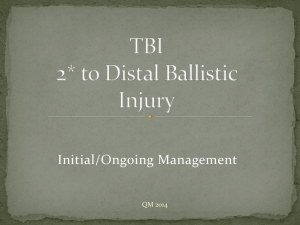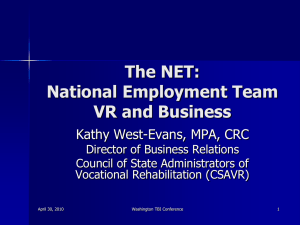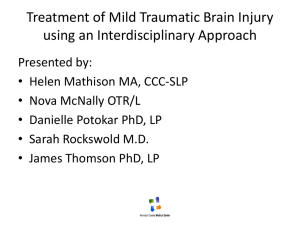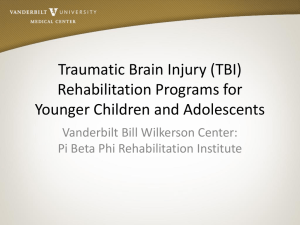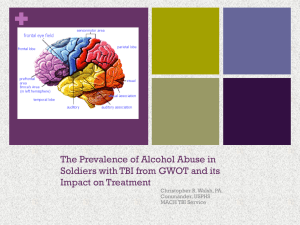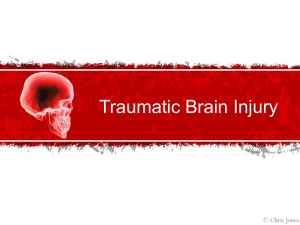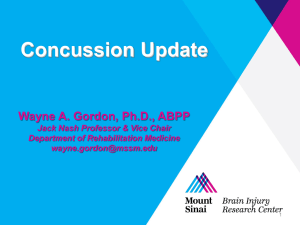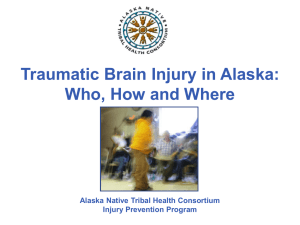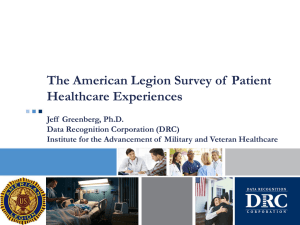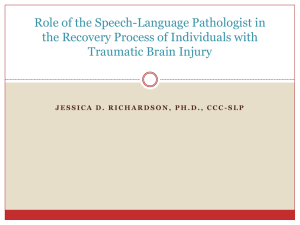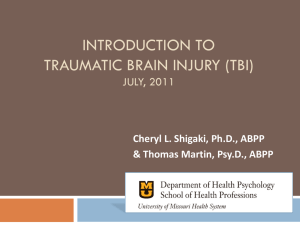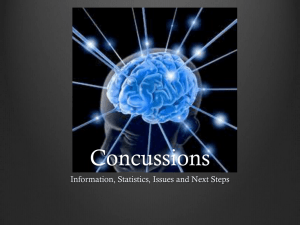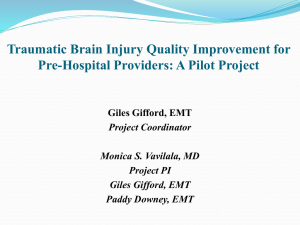Guided IEP PowerPoint presentation - Center for Parent Information
advertisement
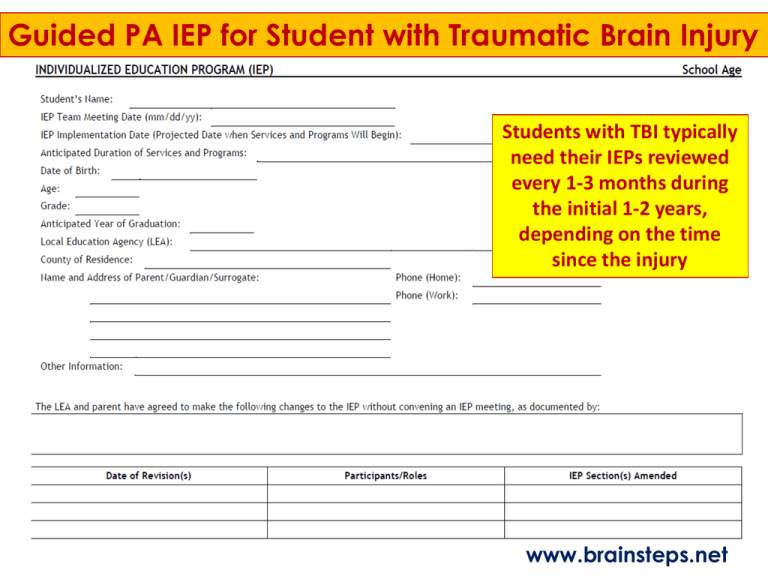
Guided PA IEP for Student with Traumatic Brain Injury Students with TBI typically need their IEPs reviewed every 1-3 months during the initial 1-2 years, depending on the time since the injury www.brainsteps.net The team needs to include professionals knowledgeable about TBI Brain Injury Association affiliates in your state (www.biausa.org) Many students with TBI may have vision difficulties in the form of field of vision cuts, loss of vision, convergence issues – even after concussion Some students with TBI may have hearing difficulties. *Pragmatic language skills, turn taking in conversation, remembering & understanding language, difficulty maintaining a topic of conversation & other language related difficulties should be considered. Importance of teaching social acceptance of themselves following their brain injury and self disclosure. Discussing what they are comfortable sharing about their experience and with who. SLP can help. Students with TBI may need specially designed instruction regarding how to USE assistive technology devices. Students with TBI sometimes have difficulty with low frustration tolerance, perseveration, understanding social cues, fatigue. These can negatively impact school behavior, include FBA and Behavior Plans, if needed. www.brainsteps.net www.brainsteps.net Document how student has changed since TBI. Important to put accurate medical information about areas of brain impacted from brain injury to help link performance strengths and weaknesses with brain damage. In addition current medications and how the side effects may impact learning Include the student’s performance in those areas related to traumatic brain injury e.g., cognition, memory, attention, reasoning, abstract thinking, judgment, problem solving, sensory, perceptual & motor abilities, psychosocial behavior, physical functions, information processing, and processing speed. Transition planning is KEY: •Teach skills to support Executive functioning deficits •Focus on goals around self awareness of abilities •Teach Self advocacy skills •Connect student with Occupational Vocational Rehabilitation •Connect student/family with point person for waiver process if necessary Students with TBI often need support to learn Executive Functioning skills (SO IMPORTANT AFTER TBI!) as they are needed: learning to plan, organize and make judgments, self monitor, self regulate, etc. Plans to use the student’s interests and motivation to gain skills needed for employment. e.g., Kenzie wants to go to college. She needs to get her driver’s license to drive there Students with TBI may need support for life skills, even if they have high grades or function well in other areas. Often skills are scattered with strengths in some cognitive areas that are needed for higher education/post secondary, but daily management skills are compromised. Important to plan for splinter skills, strengths and weaknesses Consider the student’s needs in areas such as: •Fatigue •Pain management •Memory •Slow processing speed •Physical management of materials •Vision •Need for structure in solving these types of problems Also, consider medically excusing, if student has the above and endures debilitating set backs following this kind of testing. Students with TBI may need accommodations to help with fatigue, pain management, memory, etc. They may need to cut repetition (50% of the work), they may need teacher notes…there are many accommodations teachers can utilize to alleviate cognitive fatigue & preserve cognitive reserve for a student following TBI. Consider the student’s needs in areas such as: •Fatigue •Pain management •Memory •Attention •Slow processing speed •Physical management of materials •Vision Need for structure in solving these types of problems, etc. Students may need specially designed instruction to help with memory strategies. Students with TBI benefit from consistency and utilizing strategies within the provided curriculum. Depending where the damaged areas of the brain are located multiple attempts with different approaches may be needed to determine what makes the most sense for the student. Social adjustment after a TBI can be difficult. Consider the student’s need for specially designed instruction on help with self regulation (self monitoring, self awareness), recognizing fatigue, or understanding social situations, etc. Some students need specially designed instruction to learn effective study strategies across multiple settings, over time. Also consider SDI – use of adaptive equipment =Assistive Technology Plan on multiple IEP revisions, especially for students who had a TBI within the last 1-3 years because the student may: 1. Meet goals quickly and need new goals 2. Not make progress or may need a different approach * Rapid change occurs during the first few yrs post injury! Student may not need some services for the entire year. Some students with TBI need a shortened school day to help with the management of fatigue, chronic pain, sleep difficulties, headaches – especially initially…Students may also need breaks between classes (e.g., study hall) where they are allowed a brain break without any cognitive tasks (nurses office or the library). This should not be when therapies take place especially if they are newly re-entered into the classroom setting. Side effects of medications, assistive technology, memory aids, etc. Training for teachers SPECIFIC to TBI and the student’s individual needs should definitely be included in the student’s IEP. CRUCIAL! Students with memory difficulties, high levels of fatigue, or other needs associated with TBI may need ESY. ESPECIALLY during the first 2 years post TBI. Not only should regression and recoupment be considered, but serious consideration should be given to the fact that during early recovery, this is a critical learning period in the student’s academics Student with TBI need appropriate peer models in order to learn or re-learn how to act in social situations. Look beyond the student’s current appearance and abilities. Many students with TBI change dramatically if provided with appropriate challenges. www.brainsteps.net Students with TBI may need several types of support to be coordinated together
